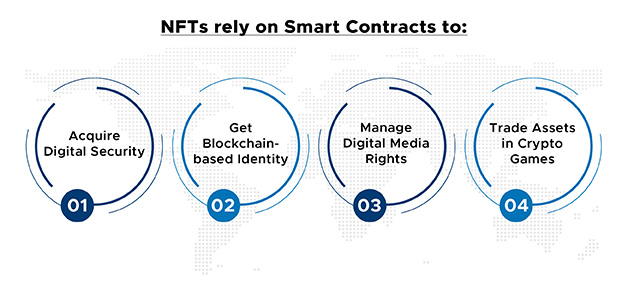-
This blog gives you a thorough understanding of the importance of smart contract development for NFT solutions, why NFTs rely on smart contracts, use cases of NFT smart contracts, and more.
Understanding an NFT and a Smart Contract
To understand NFT smart contracts, one must first understand NFT and smart contracts separately.
An NFT is a digital copy of unique assets that you cannot interchange with another NFT. These tokens support file formats, including jpg, png, gif, MP3, MP4, etc. Individuals can buy or sell NFTs in the NFT marketplace.
A smart contract is a program that executes a task after fulfilling a pre-determined condition. It completes the assigned task without any human intervention. Therefore, it eliminates the need for a third party or a middleman. Ultimately, smart contracts prevent human errors, save time, and reduce costs compared to traditional contracts.
Creating NFTs With Smart Contracts

An NFT smart contract is a code-based and self-executing system. Developers create NFTs through the minting process, which entails transforming pictures, movies, sound snippets, and other digital media into cryptographic assets on a blockchain. When you mint NFTs, smart contracts automatically give you ownership rights. Here, the smart contract code determines the characteristics of your crypto assets. When you sell your NFTs, the smart contract will automatically transfer the ownership rights to a purchaser.
There are many standards for smart contracts to guarantee that NFTs can readily interact with applications. For instance, several smart contract blockchains like Tezos, EOS, and TRON have NFT creation tools. You cannot trade an NFT in an NFT marketplace minted on a different platform if there is no common standard for how smart contracts, and ultimately NFTs, must be coded.
The most commonly used standard for creating NFT on Ethereum is ERC 721. You cannot split or swap the token generated from this standard with another ERC 721 token. Thus, this standard lets a creator use special crypto assets through its contract. Another smart contract standard for NFT development is ERC 1155. It lets developers create semi-fungible tokens specifically for the NFT gaming sector.
Also, Read | A Quick Guide to Understanding Semi-Fungible Tokens
Applications of NFT Smart Contracts
Access to Token Gating
Accessing token-gated experiences is among the earliest applications of NFTs and smart contracts. Essentially, NFTs can serve as tickets for both real-world events and digital ones.
An example of a digital asset that allows owners access to real-world locations is VeeFriends. Each VeeFriends token's smart contract stipulates that its owners will get one NFT ticket every year (from 2022 to 2024). The ticket will give them access to the VeeCon superconference. Each year, holders of this ticket receive an automated airdrop giving them entry to the event. It is not possible to enter the conference without one of these tickets.
Ability to Create Unique Merchandise
Another usage of NFT smart contracts is their capability to enable creators to provide their holders with distinctive presents. With a token-gated checkout process, users of particular tokens can access free goods by linking their virtual wallets to a site.
Again, VeeFriends did a great job when it came to creating unique merchandise. It gave token owners free access to premium goods like clothes, wine, etc. In other situations, the items were only available to token holders and were never made available to the general public. Owning this specific NFT has benefits beyond only tangible goods. For instance, all VeeFriends holders were eligible to receive free NFTs "Series 2" tokens merely for owning the originals.
Enforcing Ownership and Verifying the Authenticity
Data authentication and ownership enforcement are benefits of using smart contracts to create NFTs. Anybody can get information regarding ownership and creation time if you have stored NFTs on public blockchains.
In the context of digital degrees, academic institutions may provide distinctive NFTs to pupils on public blockchains. Employers wishing to recruit students can use block explorer to perform a search to confirm the validity of a candidate's degree. Anyone can view the public information stored on the blockchain using this search engine.
You can also use this concept in NFT licensing. NFT smart contracts can generate information on the transferred rights of a picture or music file. Also, it quickly forwards these rights to the succeeding NFT token holder. Anyone can verify the ownership as well as the rights granted to purchasers.
Preventing Plagiarism and Counterfeiting
Smart contracts can also prevent plagiarism and piracy through NFTs. Smart contracts can autonomously verify an NFT or token's creation time and location as they are formed on the blockchain. Additionally, smart contracts can monitor the ownership of artistic content, prevent counterfeit certificates, and aid in the elimination of fake goods. For instance, the system will automatically reject such items if they do not meet particular requirements.
Also, Read | Emerging NFT (Non-Fungible Tokens) Use Cases Beyond the Hype
Conclusion
To sum it up, smart contract solutions give many creative people the assurance and confidence they need to generate NFT tokens. It also boosts their trust to earn from selling NFTs in decentralized markets. Many people are becoming interested in NFT development services. If you want to create NFTs, then we, at Oodles Blockchain, can assist you in launching your NFTs. Our expertise span building NFTs, metaverse, gaming, entertainment, real estate, fashion, and more. We also develop extremely secure NFT smart contract systems.
To discuss your business needs, contact our subject matter specialists.

Our Offices
INDIA
Emaar Digital Greens, Sector 61,
Gurugram, Haryana
122011.
Welldone Tech Park,
Sector 48, Sohna road,
Gurugram, Haryana
122018.
















